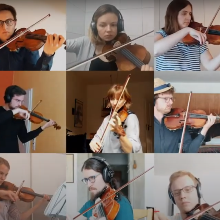The idea for the “virtual Verdi solidarity project” of Unimusik Stuttgart (the academic choir and orchestra of the University of Stuttgart) was born in the first weeks of the Europe-wide corona lockdown, in response to two needs. The desire of the members of the academic choir and orchestra to return to this large family in thought and in musical tones - as they usually do in a weekly rhythm - while at the same time keeping social distance, and to draw comfort and strength from making music. And the wish of several choir members, who have a personal connection to the University of Bergamo through the partnership of the two institutions, to give a sign of solidarity to the city that was probably worst affected by the corona pandemic in Europe.
The famous prisoner choir “Va, pensiero” from Verdi's opera “Nabucco” was chosen, which, like no other opera choir, expresses the longing for home and freedom. Everyone was to practice his or her instrumental or vocal part according to a few guidelines and record it at home. From this huge puzzle a common choir and orchestra sound was then put together by technical means!
A successful experiment
This recording is now finished. “A successful experiment, because even if such a virtual ensemble can never achieve the coordination of people actually listening and playing next to each other, the emotional power of the statement and the imagination of the musicians permeates the distance,” explains Mihály Zeke. “This strengthens in us the hope that human compassion, listening to each other and thinking of each other, which are qualities so fundamental to music, can contribute to the fact that we as Europeans and as humanity can hold together in these difficult times and become better together.”
The welcome address is given by Maria Rimini-Döring, a singer of the academic choir, who comes from Bergamo. The piece of music starts at 2:42 minutes.
Interview with the new musical director of the university
Mihály Zeke is delighted “to work with enthusiastic young people and to accompany them through the discovery and performance of great works of choral and orchestral literature”. We asked him about his plans.
What are your plans for the next two years?
Based on our current planning, we again want to perform one of the most exciting oratorios in the history of music, Mendelssohn’s “Elijah”, in the Liederhalle in February 2021. In addition, I also envisage separate performances for the academic choir and the academic orchestra, for example in the Stiftskirche or in the Züblin House. The plans for 2022 are not yet fixed. The tendency is, however, to perform a larger work created outside the European continent.
Travels are also an integral part of university music life, and the framework of these travels also determines the choice of repertoire. Due to the current corona crisis we have to juggle with several parameters in our considerations and make contingency plans! Of course all university musicians hope that, in Germany and elsewhere, it will soon be possible to make music under normal conditions again.
What would you like to focus on?
With the choir I would like to put more emphasis on a cappella singing. With the orchestra, I would like to continue the tradition of working on great symphonies - including the 5th Symphony by Tchaikovsky, which was originally planned for this summer semester. On the other hand, I would also like to explore modern orchestral literature of the 20th and 21st centuries more regularly.
Can you tell us some stations of your career?
I was born in London in 1982, then grew up in Hungary and Greece, the homes of my two musical parents. In my youth, my love was equally devoted to art and science. At first I started studying biology, but after a significant encounter with Helmuth Rilling, I finally decided to study music and took up a double degree program in church music and piano at the State University of Music and Performing Arts Stuttgart, and later completed postgraduate studies in choral and orchestral conducting. The next stop was Dijon, where I was the director of the opera choir for three years, then another three years in Paris. From there I directed the Arsys chamber choir, which is based in Burgundy, on a project basis and worked as a freelancer in England, Germany, and Hungary. I came to the beloved “Ländle” (“the little country” in the regional dialect) in 2018 with a professorship at the University of Sacred Music in Tübingen.




